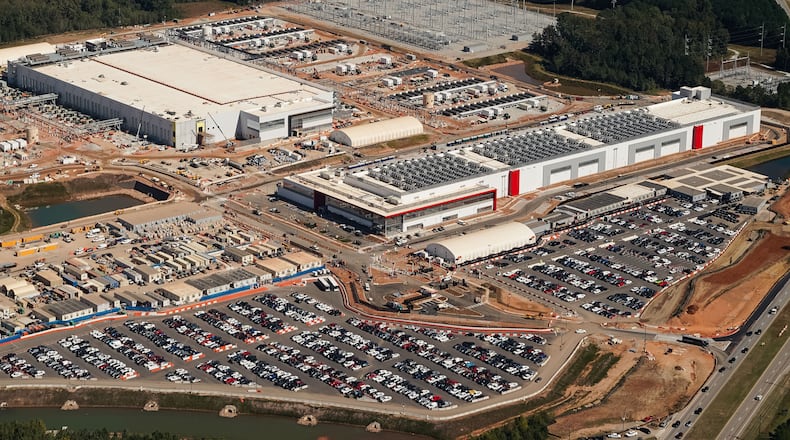SAVANNAH — A Georgia agency set new rules Thursday for how large data center proposals should be evaluated by regional planners, rules that will also make it easier for the public to learn where the huge and controversial computing centers have been proposed.
The Georgia Department of Community Affairs board unanimously codified parameters for how data centers should be reviewed during the Development of Regional Impact process, an infrastructure study typically required for large projects.
The new rules are poised to end a prolonged pause the DCA initiated over the summer that stopped new data center projects from entering into the regional review process, though city and county zoning processes were not affected.
First reported in July by The Atlanta Journal-Constitution, the DCA’s pause was designed to provide time to write rules for how data centers should be analyzed during the DRI process. But it also presented a monthslong gap in which there was not a centralized place where the public could see where such campuses were being proposed statewide. Local leaders could still consider — and potentially process — new proposals that didn’t go through the additional regional review and oversight.
“We have been in a blind spot,” said Chris Manganiello, water policy director for the Chattahoochee Riverkeeper. “I think it should help open up that (DRI review) window again and see what’s happening.”
Data centers, which are effectively gigantic warehouses filled with computer servers, have been around for decades but nowhere near the scale of modern proposals. To serve the country’s growing digital needs and power artificial intelligence, tech giants and developers have favored building campuses of data centers worth billions of dollars and spanning hundreds of acres.
Clustering this power-hungry equipment into a smaller footprint increases efficiency, but it also places new strains on surrounding utility grids and communities. Many communities have started to push back against the campuses, concerned about their power and water demands and other factors.
The number of data center proposals that entered the DRI process has rapidly increased since AI gained prominence in 2023 through the DCA’s pause in June.
Credit: Courtesy Amazon Web Services / Noah Berger
Credit: Courtesy Amazon Web Services / Noah Berger
A DRI review is often the first time many large developments enter the public eye. The process, which can be triggered by a rezoning request or permit application, evaluates a project’s water consumption, power needs and traffic demands, plus can reveal other information about a development’s scale.
The DCA told the AJC in July its pause was because of the growing frequency of data center projects that were flooding Georgia’s DRI submissions. In the 11-county metro Atlanta area, 44 DRI applications for data centers were submitted in 2023, 2024 and the first five months of 2025. Only six such applications were made from 2020 to 2022.
Data centers were not among the 20 development types currently within DCA’s rules for DRIs, which the agency said necessitated the pause and review. The last time the DCA revised its DRI standards was in 2014.
Thursday’s vote during a Department of Community Affairs meeting in Savannah defines data centers as a “technological facility” and set rules for how large new projects need to be to trigger a DRI review.
“Because these rules had not been updated for 10 years, technological facilities had not been envisioned,” DCA Commissioner Christopher Nunn told the AJC. “Instead of having a patchwork across the state where commissions were playing by different rules, we wanted to create a communication process where communities can talk to each other.”
Data centers must be larger than 300,000 square feet in the 11-county metro Atlanta area, while rural data centers are required to be more than 500,000 square feet to qualify for reviews. DRI reviews are advisory and are intended to provide local leaders with more information, but the review’s results do not permit or deny projects from moving forward.
“This is not meant to infringe on local decision making,” DCA Deputy Commissioner Rusty Haygood said during Thursday’s meeting. “This is a communication requirement for consultation.”
Environmentalists and community activists generally supported the new rules, while the only negative public comments the DCA said it received were from data center trade organizations.
“I can’t think of data centers as just some other industrial development,” Manganiello said. “It’s not just like another warehouse. They are unique and unprecedented in their own selves based on their potential energy and water demands.”
Like many large economic development projects, data center proposals are often shrouded in secrecy and nondisclosure agreements, or NDAs. Mark Woodall, legislative chair of the Sierra Club Georgia Chapter, said the DRI review is a unique tool in Georgia that sheds light on new projects — clarity that has been missing since the summer.
“Between the pause in the DRI reports and all the NDAs being signed by local officials, the invasion of data centers is hard to track,” Woodall said in an email.
Only data center projects included with other large development aspects, such as a hospital project in Butts County that also includes computer storage farms, triggered DRIs amid the pause. Other data center proposals were made public only at the local level through county meeting agendas and rezoning requests.
“By formally recognizing data centers within the DRI framework, DCA can help ensure that these high-impact facilities are subject to comprehensive review for their environmental, infrastructural and community implications,” Adrien Webber, director of the Sierra Club Georgia Chapter, said in a statement.
The amended rules will be filed with the Georgia secretary of state for final approval and publication. The rules will become effective 20 days after.
Keep Reading
The Latest
Featured




